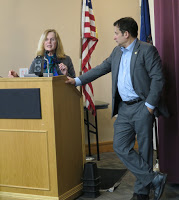Lawmakers urge environmental advocates to get more active in politics
 |
| A full house at an environmental advocacy workshop. |
Elected officials urged people concerned about the environment to take a more active role in politics at a workshop at Green Spring Gardens March 18.
At least 100 people attended the meeting, which was sponsored by the Audubon Society of Northern Virginia and other organizations.
“The environmental community by and large has been missing in action,” Rep. Gerry Connolly told the group. “It’s as if people think political activism is dirty and beneath you. If that’s true, you get what you deserve.”
Connolly urged environmentalists to get active in supporting political candidates who share their values.
The Trump Administration’s cabinet is full of people who want to eliminate the agencies they’re in charge of, including Scott Pruitt at the Environmental Protection Agency, he noted. Trump has proposed slashing the EPA budget by 31 percent, eliminating funding for climate change research, and terminating many programs, including the Chesapeake Bay cleanup program.
It’s an “ideological assault” by far-right extremists that would lead to real consequences, he said, including rising sea levels and storm surges, and threatening the livelihood of coastal communities. In Virginia, the new light rail system in Hampton would be underwater a few months every year.
In 2010, when 63 pro-environmental members of Congress were defeated. “the environmental community was missing in action,” Connolly said. “We cannot afford to be passive. You have got to get over your cultural hang-ups about politics.”
 |
| Kory and Levine |
“Today the environmental movement is a partisan issue,” he said. The other side, supported by the Koch brothers, is all about gutting clean water and clean air laws, promoting coal, and opposing actions on climate change.
Those who oppose environmental protection see it as intrusive government, as a “job killer,” he said, despite the fact that clean energy technology is creating new jobs and the Clean Air Act has led to a decrease in respiratory illnesses.
“We need you to get politically involved, if we’re going to win this battle. We’re fighting for the soul of our country,” Connolly said. “We can turn this around. We need your help. If we get active, we will prevail.”
Environmental activists also need to focus on the state government, said Del. Kaye Kory, who represents the 38th district (Annandale) in the General Assembly.
Kory urged the audience to press for fair redistricting. Gerrymandering has resulted in a large Republican majority in the General Assembly. Many Republican lawmakers won by narrow margins, while all the statewide offices are held by Democrats.
“We need to have a voice that represents the voters,” Kory said. “That is most important thing that needs to be done.” Redistricting will be taken up by the General Assembly after the 2020 census. Because the governor plays a big role in that effort, she urged people to support Ralph Northam, who’s running in the Democratic primary in June.
When reaching out to representatives in the General Assembly, Kory urged environmental advocates to “literally be a pain in the ass.” Group emails and petitions are less effective that efforts that put a face on the issue, like knocking on doors, attending town halls, and coming to Kory’s office hours. “That is really what makes a difference,” she said.
Del. Mark Levine (45th District), who represents the eastern part of Alexandria in the General Assembly, agreed with Kory about the importance of personal contacts with elected leaders. Both Kory and Levine got 100 percent scores from the Virginia League of Conversation Voters.
Levine got involved in politics after his sister was murdered by her husband in Tennessee 20 years ago. Under state law, their children couldn’t be removed from a parent unless there was evidence of child abuse. He worked to change that law and eventually succeeded. Subsequently, Levine worked as a citizen advocate in support of marriage equality laws.
From those experiences, he learned “it’s most effective to talk to legislators one-on-one in a private conversation.”
Show them studies; you probably know more about a technical issue you’re involved with than they do, Levine advised. Draft legislation for them. Introduce yourself after a town hall. “Once someone knows you and likes you, it’s more likely they will want to help you.”
He urged people to focus on their own representatives. If someone sends Levine an email, the first question he asks is, “is it a constituent?” If they are, “they get the royal treatment.” If a constituent comes to his office, “I will meet with you,” he says. And anyone can come to his monthly chats at the Del Ray Café in Alexandria.
Even if a lawmaker is not on your side, “go to them privately and try to talk to them,” he says. “If you can get 15 percent of what you want, that’s all right.” If they refuse to talk to you, then “it’s okay to blast them.”


"The environmental community by and large has been missing in action,” Rep. Gerry Connolly told the group…" They haven't been missing. They simply bailed after Hillary Clinton won the Democratic nomination. Tree huggers are as politically doctrinaire as their opponents. If they don't immediately get their way, they either get behind the nearest third party candidate or just stay home. Trump's supporters may unfortunately be willing to trade the environment for the promise of jobs, but at least they're present.
You don't know tree huggers well at all.
Tree huggers were in the vanguard of the "Gore isn't any different than Dubya" movement in 2000. Michigan GOP Rep. Mike Rogers also won his first of seven terms by 111 votes that year after the local tree huggers opted out for the same reason. In short, these guys exemplify the "effete intellectual snobs" that former Vice President Spiro Agnew used to ridicule. When it comes to courting the votes of tree huggers, the juice isn't worth the squeeze.